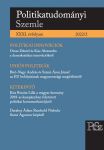Az Európai Unió közpolitikai hatásának percepciói – A magyarok tudása és preferenciái az EU befolyásáról
Perceptions of the Eu’s Policy Impact: Europeanization of Public Attitudes in Hungary
Author(s): András Bíró-Nagy, Áron József SzásziSubject(s): Political behavior, Politics and communication, Politics and society
Published by: MTA Politikai Tudományi Intézete
Keywords: Hungary; European Union; Public Policy; Euroscepticism; Public Opinion
Summary/Abstract: This paper investigates the perceptions of the EU’s policy impact by revealing the Hungarian public’s awareness of the EU’s domestic policy influence and its attitudes towards Europeanization. The research is based on descriptive and regression analyses of cross-sectional survey data. In accordance with our expectations, the majority of Hungarians could not correctly locate the level of integration of most policies, and misperceptions about the policy influence of the EU on Hungarian domestic politics are widespread. It is a sign of Eurosceptic “wishful thinking” that the higher level of sovereignty respondents preferred, the more policies they assumed to be controlled exclusively by member states. Contrasting the expected results, respondents were more likely to support the EU integration of those policies that are in fact Europeanized to a larger extent. Pro-government supporters and voters of right-wing identity in general have a lower probability to support EU integration of policies. Our study also shows that there may be serious barriers to further deepening European integration in Hungarian society and that there is a strong base for the politics of national sovereignty. Out of the 19 public policy areas we studied, 8 areas have an absolute majority of Hungarians in favour of national sovereignty, while pro integrationists have an absolute majority in 9 policy areas, and neither side has a majority on immigration or health care. In addition, it should be pointed out that only a very small proportion of Hungarian society would refer decisions to the exclusive competence of the European Union: the supporters of the United States of Europe are less than 10% in all public policy areas. The division on the question of competences suggests that debates on the future of the EU may also polarise Hungarian public opinion in the future.
Journal: Politikatudományi Szemle
- Issue Year: XXXI/2022
- Issue No: 2
- Page Range: 31-69
- Page Count: 39
- Language: Hungarian

